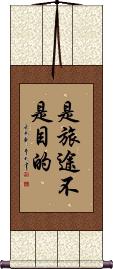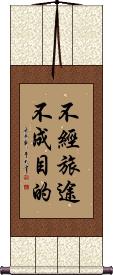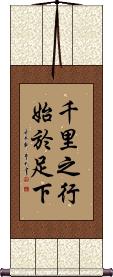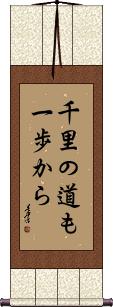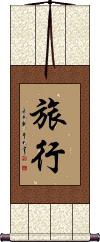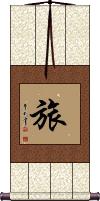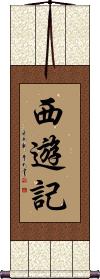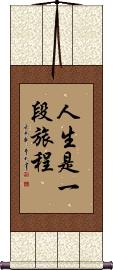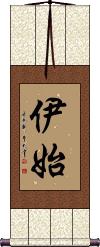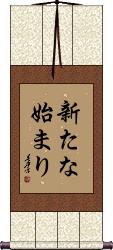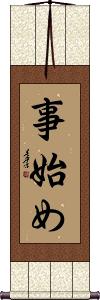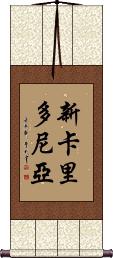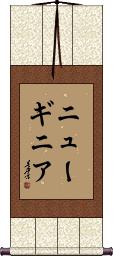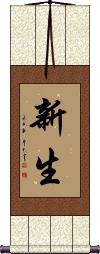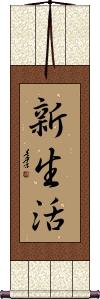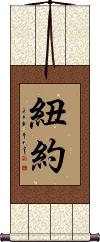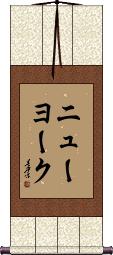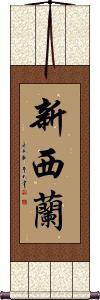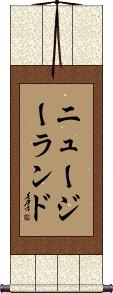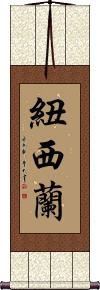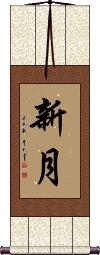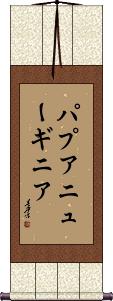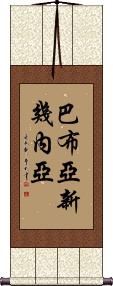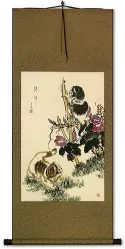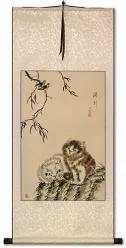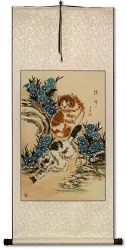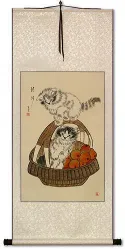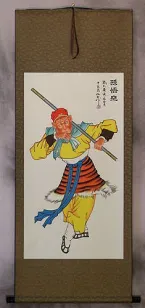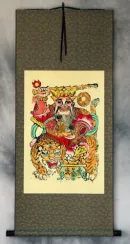Many custom options...
And formats...

Not what you want?
Try other similar-meaning words, fewer words, or just one word.
A New Journey in Chinese / Japanese...
Buy an A New Journey calligraphy wall scroll here!
Personalize your custom “A New Journey” project by clicking the button next to your favorite “A New Journey” title below...
Switched to secondary search mode due to lack of results using primary.
These secondary results may not be very accurate. Try a different but similar meaning word or phrase for better results. Or...
Look up A New Journey in my Japanese Kanji & Chinese Character Dictionary(My dictionary is a different system then the calligraphy search you just tried)
If you want a special phrase, word, title, name, or proverb, feel free to contact me, and I will translate your custom calligraphy idea for you.
2. It is the Journey, Not the Destination
3. The Destination is Nothing Without the Journey
4. A Journey of 1000 Miles Begins with a Single Step
10. New Caledonia
11. New Guinea
12. New Life
13. New York
14. New Zealand
15. New Moon
16. Learn New Ways From Old / Onkochishin
17. Papua New Guinea
18. Pleasant Journey
Happy New Year
If you want to wish someone a happy new year, 新年快樂 is the way.
You can hang this up during Western New Years (Dec 31st - Jan 1st) and keep it up until after Chinese New Year which happens in either January or February of each year (it changes from year to year because China uses a lunar calendar).
It is the Journey, Not the Destination
The Destination is Nothing Without the Journey
A Journey of 1000 Miles Begins with a Single Step
A Journey of 1000 Miles Begins with a Single Step
senri no michi mo ippo kara
千里の道も一歩から is the Japanese version of an ancient Chinese proverb that means “a journey of a thousand miles begins with a single step.”
Some will also translate this as a 1000-mile road starts with one brick (a small amount).
In this case, the real measurement is an ancient Chinese “li” or 里, which is romanized as “ri” in Japanese. It's about half a kilometer, so three 里 would be a western mile. A journey of 333 miles begins with a single step, just doesn't sound as natural.
Note: Because this selection contains some special Japanese Hiragana characters, it should be written by a Japanese calligrapher.
Journey / Travel
旅行 means journey or travels. It is sometimes used to refer to a vacation.
If you like a good adventure, maybe this is the word for you.
Journey / Travel
旅 is a single Chinese character, Japanese Kanji, and old Korean Hanja that means trip, travel, or journey.
In an older context, this could refer to an army brigade or a 500-man battalion from the Zhou-dynasty Chinese army.
Journey to the West
西遊記 is the original title of the novel Journey to the West.
Written during the Ming dynasty, this novel by Wu Cheng'en (吳承恩) is one of the four classic stories of Chinese literature.
Sometimes this book is titled, Pilgrimage to the West, Monkey King, or Magic Monkey.
Many movies and TV series depict or adapt portions of this story.
Life is a Journey
Journey of Life
If you believe that life is a journey, this is a nice Japanese title for your wall.
人生行路 means “journey of life” in Japanese Kanji. The actual word order is more like “life (人生) journey (行路)” as Japanese grammar is a bit different than English.
Note: The “journey” part can also be translated as “road,” so this is also how to say “the road of life.”
New Beginning
New Beginning
伊始 is a short version of “new beginning” or simply “beginning” in Chinese characters.
You can also translate this as “from this moment on,” “starting now,” or “henceforth.”
In the day-to-day speech, this word can apply to starting a new job, beginning a new career, entering a new chapter of your life, or taking a new position (in politics, scholarship, etc.).
New Beginning
新たな始まり is a Japanese word that means “new beginning” or “new start.”
Here's the character breakdown:
新た (arata) = new; fresh; novel; newly; freshly; or this can be like the prefix “re-” like “re-start” or “reset.”
な (na) is kind of a connecting article. This glues “new” to “beginning.”
始まり (hajimari) = origin; beginning.
Note: Because this selection contains some special Japanese Hiragana characters, it should be written by a Japanese calligrapher.
New Beginning
New Beginning
新しい始め is a verbose Japanese phrase that means “new beginning.”
The first three characters mean new, novel, fresh, recent, latest, up-to-date, or modern.
The last two characters mean beginning, start outset, opening, or origin.
Note: Because this selection contains some special Japanese Hiragana characters, it should be written by a Japanese calligrapher.
New Caledonia
This is the Chinese name for the country of New Caledonia (overseas territory of France).
See Also: North America
New Caledonia
New Guinea
New Life
新生 literally means “new life” or “new birth” in Chinese, Japanese Kanji, and old Korean Hanja.
Depending on the context, this word can also mean newborn, new student, rebirth, new birth, or nascent.
In Japanese, this can be the given name Wakaki.
Note: This is not the most common word selection for a calligraphy wall scroll. But if you’re a westerner, you can bend the rules a bit.
New Life
This literally means “new life” or “new livelihood” in Japanese Kanji.
新生活 is most appropriate if you are starting a new career or otherwise are starting a new chapter in your life or a new beginning.
Note: This is not the most common word selection for a calligraphy wall scroll. But if you’re a westerner, you can bend the rules a bit.
New York
New York
New Zealand
This is the Chinese name used in Mainland China for the country of New Zealand.
Note: There are two common titles for New Zealand. Just the first character changes but you might see the other title in Taiwan and Singapore.
Japanese note: This is an archaic way to write New Zealand in Japanese Kanji. In modern times,
it’s
written ニュージーランド (same pronunciation but using Katakana characters).
New Zealand
New Zealand
New Moon
Learn New Ways From Old / Onkochishin
New ideas coming from past history
溫故知新 is a proverb from Confucius that is used in Chinese, Japanese, and Korean cultures.
It can be translated in several ways:
Coming up with new ideas based on things learned in the past.
Examine things of the past, and obtain new knowledge.
Developing new ideas based on the study of the past.
Gain new insights through restudying old issues.
Understand the present by reviewing the past.
Learning from the past.
Review the old and know the new.
Taking a lesson from the past.
Taking a lesson from the wisdom of the ancients.
Follow the old ways.
The direct translation would be, “By asking old things, know new things.”
The Character meanings breakdown this way:
溫故 = ask old
知新 = know new
Explained: To learn new things that are outside of your experience, you can learn from old things of the past. You can find wisdom in history.
Note: Japanese use a variant of the first Kanji in modern times.
Therefore if you order this from a Japanese calligrapher, expect the first Kanji to look like 温 instead of 溫.
In addition to 温故知新 as mentioned above, this is sometimes written as 温古知新 in Japan.
Papua New Guinea
Papua New Guinea
Papua New Guinea
Pleasant Journey
A Journey of 1000 Miles Feels Like One
千里も一里 is a Japanese proverb that states “A journey of a thousand miles feels like only one mile.” It is understood that in the proverb, this applies when going to see the one you love.
Note that the “mile” or 里 used in this proverb is an old Chinese “li” (pronounced “ri” in Japanese). It's not actually a mile, as the measurement is really closer to 500 meters (it would take 3 of these to get close to a western mile). Still, 1000里 (333 miles) is a long way.
This in-stock artwork might be what you are looking for, and ships right away...
Gallery Price: $144.00
Your Price: $79.88
Gallery Price: $83.00
Your Price: $45.88
Gallery Price: $90.00
Your Price: $49.88
Gallery Price: $52.00
Your Price: $28.88
Gallery Price: $52.00
Your Price: $28.88
Gallery Price: $52.00
Your Price: $28.88
Gallery Price: $52.00
Your Price: $28.88
Gallery Price: $52.00
Your Price: $28.88
Gallery Price: $83.00
Your Price: $45.88
Gallery Price: $120.00
Your Price: $79.88
Gallery Price: $200.00
Your Price: $69.88
The following table may be helpful for those studying Chinese or Japanese...
| Title | Characters | Romaji (Romanized Japanese) | Various forms of Romanized Chinese | |
| Happy New Year | 新年快樂 新年快乐 | xīn nián kuài lè xin1 nian2 kuai4 le4 xin nian kuai le xinniankuaile | hsin nien k`uai le hsinnienkuaile hsin nien kuai le |
|
| It is the Journey, Not the Destination | 是旅途不是目的 | shì lǚ tú bú shì mù dì shi4 lu:3 tu2 bu2 shi4 mu4 di4 shi lu: tu bu shi mu di shilu:tubushimudi | shih lü t`u pu shih mu ti shihlütupushihmuti shih lü tu pu shih mu ti |
|
| The Destination is Nothing Without the Journey | 不經旅途不成目的 不经旅途不成目的 | bù jīng lǚ tú bù chéng mù dì bu4 jing1 lu:3 tu2 bu4 cheng2 mu4 di4 bu jing lu: tu bu cheng mu di bujinglu:tubuchengmudi | pu ching lü t`u pu ch`eng mu ti puchinglütupuchengmuti pu ching lü tu pu cheng mu ti |
|
| A Journey of 1000 Miles Begins with a Single Step | 千里之行始於足下 千里之行始于足下 | qiān lǐ zhī xíng shǐ yú zú xià qian1 li3 zhi1 xing2 shi3 yu2 zu2 xia4 qian li zhi xing shi yu zu xia qianlizhixingshiyuzuxia | ch`ien li chih hsing shih yü tsu hsia chien li chih hsing shih yü tsu hsia |
|
| A Journey of 1000 Miles Begins with a Single Step | 千里の道も一歩から | sen ri no michi mo i-ppo ka ra senrinomichimoi-ppokara sen ri no michi mo i-po ka ra | ||
| Journey Travel | 旅行 | ryokou / ryoko | lǚ xíng / lv3 xing2 / lv xing / lvxing | lü hsing / lühsing |
| Journey Travel | 旅 | ryo / tabi | lǚ / lu:3 / lu: | lü |
| Journey to the West | 西遊記 西游记 | sei yuu ki / seiyuuki / sei yu ki | xī yóu jì xi1 you2 ji4 xi you ji xiyouji | hsi yu chi hsiyuchi |
| Life is a Journey | 人生是一段旅程 | rén shēng shì yí duàn lǚ chéng ren2 sheng1 shi4 yi2 duan4 lv3 cheng2 ren sheng shi yi duan lv cheng renshengshiyiduanlvcheng | jen sheng shih i tuan lü ch`eng jen sheng shih i tuan lü cheng |
|
| Journey of Life | 人生行路 | jinseikouro jinseikoro | ||
| New Beginning | 新的開始 新的开始 | xīn de kāi shǐ xin1 de kai1 shi3 xin de kai shi xindekaishi | hsin te k`ai shih hsintekaishih hsin te kai shih |
|
| New Beginning | 伊始 | yī shǐ / yi1 shi3 / yi shi / yishi | i shih / ishih | |
| New Beginning | 新たな始まり | arata na hajimari aratanahajimari | ||
| New Beginning | 事始め | kotohajime | ||
| New Beginning | 新しい始め | atarashii hajime atarashiihajime atarashi hajime | ||
| New Caledonia | 新卡里多尼亞 新卡里多尼亚 | xīn kǎ lǐ duō ní yà xin1 ka3 li3 duo1 ni2 ya4 xin ka li duo ni ya xinkaliduoniya | hsin k`a li to ni ya hsinkalitoniya hsin ka li to ni ya |
|
| New Caledonia | ニューカレドニア島 | nyuukaredoniatou nyukaredoniato | ||
| New Guinea | ニューギニア | nyuu gi ni a nyuuginia nyu gi ni a | ||
| New Life | 新生 | waka ki / wakaki | xīn shēng xin1 sheng1 xin sheng xinsheng | hsin sheng hsinsheng |
| New Life | 新生活 | shin sei katsu shinseikatsu | ||
| New York | 紐約 纽约 | nyuyooku / nyuyoku | niǔ yuē / niu3 yue1 / niu yue / niuyue | niu yüeh / niuyüeh |
| New York | ニューヨーク | nyuuyooku / nyuyoku | ||
| New Zealand | 新西蘭 新西兰 | nyuu jii ran do nyuujiirando nyu ji ran do | xīn xī lán xin1 xi1 lan2 xin xi lan xinxilan | hsin hsi lan hsinhsilan |
| New Zealand | ニュージーランド | nyuu jii ran do nyuujiirando nyu ji ran do | ||
| New Zealand | 紐西蘭 纽西兰 | niǔ xī lán niu3 xi1 lan2 niu xi lan niuxilan | niu hsi lan niuhsilan |
|
| New Moon | 新月 | shingetsu | xīn yuè / xin1 yue4 / xin yue / xinyue | hsin yüeh / hsinyüeh |
| Learn New Ways From Old Onkochishin | 溫故知新 温故知新 | on ko chi shin onkochishin | wēn gù zhī xīn wen1 gu4 zhi1 xin1 wen gu zhi xin wenguzhixin | wen ku chih hsin wenkuchihhsin |
| Papua New Guinea | パプアニューギニア | pa pu a nyuu gi ni a papuanyuuginia pa pu a nyu gi ni a | ||
| Papua New Guinea | 紐幾內亞 纽几内亚 | niǔ jī nèi yà niu3 ji1 nei4 ya4 niu ji nei ya niujineiya | niu chi nei ya niuchineiya |
|
| Papua New Guinea | 巴布亞新幾內亞 巴布亚新几内亚 | bā bù yà xīn jǐ nèi yà ba1 bu4 ya4 xin1 ji3 nei4 ya4 ba bu ya xin ji nei ya babuyaxinjineiya | pa pu ya hsin chi nei ya papuyahsinchineiya |
|
| Pleasant Journey | 一路順風 一路顺风 | ichirojunpuu ichirojunpu | yī lù shùn fēng yi1 lu4 shun4 feng1 yi lu shun feng yilushunfeng | i lu shun feng ilushunfeng |
| A Journey of 1000 Miles Feels Like One | 千里も一里 | sen ri mo ichi ri senrimoichiri | ||
| In some entries above you will see that characters have different versions above and below a line. In these cases, the characters above the line are Traditional Chinese, while the ones below are Simplified Chinese. | ||||
Successful Chinese Character and Japanese Kanji calligraphy searches within the last few hours...

